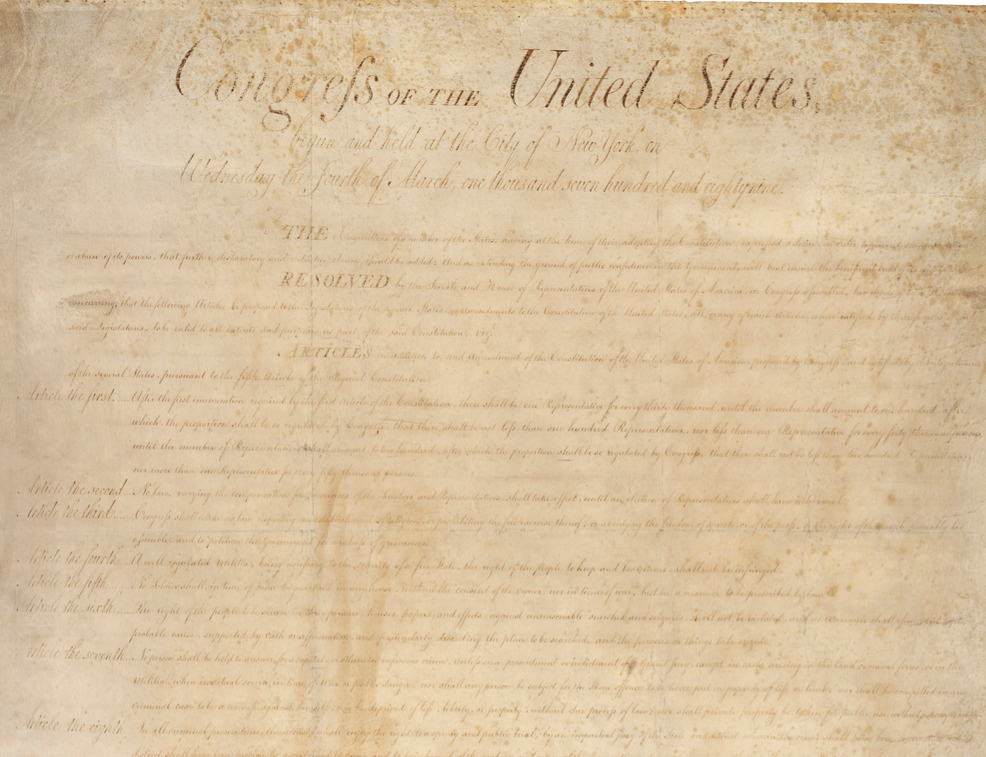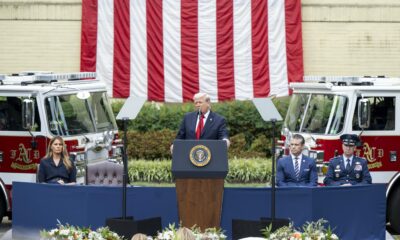Constitution
Domestic Violence Protection Orders Don’t Pass Constitutional Muster
To deprive someone of a liberty – like the right to keep and bear arms – because he’s going to do something, is not Constitutional.

How certain should we be that someone did something wrong before they lose their right to own a gun? Tuesday, the Supreme Court will hear a case that could have a major impact on how courts evaluate the constitutionality of gun control laws. The Biden administration asked for a review of the 5th Circuit Court’s decision not to deprive Zackey Rahimi of his right to own guns.
Rahimi is not someone you want to be your neighbor. He is a drug dealer with a long, violent criminal record. But instead of prosecuting Rahimi for his violent crimes or imposing sufficient bail to keep him in jail, prosecutors merely used a 2020 assault on his girlfriend to obtain a domestic violence protection order.
The Supreme Court is asking: What is the standard of evidence needed to strip someone of their constitutional right to keep and bear arms? People lose their right to a gun when convicted of felonies and some violent misdemeanors. But the Domestic Violence Protection Orders are handled as civil cases. In civil cases, you have a much lower standard of proof, no right to a lawyer, and not even necessarily a hearing. Indeed, Rahimi lost his rights without a hearing or a lawyer to represent him.
In last year’s landmark Bruen case, the Supreme Court set a template for evaluating whether a gun control law is constitutional. The opinion, written by Justice Clarence Thomas, argued that one must first look at the wording of the Second Amendment. If that weren’t conclusive, one would consider the legislative debate surrounding the passage of the amendment. Finally, one could examine whether similar laws were in effect in either 1791, when the Second Amendment was adopted, or in 1868, when the 14th Amendment applied The Bill of Rights to the states.
The Federal Domestic Violence Protection Order law didn’t pass until 1994, long after both years.
The reasoning behind Domestic Violence Protection Orders is straightforward. If people subject to a civil restraining order are dangerous, then prohibiting them from possessing firearms could save lives. On the other hand, if people under restraining orders are truly dangerous, they are unlikely to obey such a law. Someone willing to commit a serious assault or murder is already facing a significant prison sentence, a life sentence, or the death penalty. The additional penalties for illegally obtaining a gun or violating a protective order are unlikely to provide deterrence. Indeed, despite his protection order, Rahimi still got a gun and used it in a crime.
The problem is that with a low threshold for taking away a person’s guns, you are more likely to make mistakes and take away guns from innocent people. There is a big difference between “beyond a reasonable doubt” – where the odds are 98% to 2% – that someone is dangerous, and the “preponderance of the evidence” – possibly 50.1% to 49.9%. That will happen more often when we allow judges to make decisions without a hearing or without the accused having legal representation. A partner who is a threat might even get a judge to disarm their potential victim.
Indeed, peer-reviewed academic research shows Domestic Violence Protection Orders didn’t change the number of domestic gun murders or domestic murders generally.
But the Biden administration asked the court to hear Rahimi’s case because they hope the court focuses on the case’s optics – a bad guy who shouldn’t have a weapon and the issue of domestic violence. But instead of calling for Rahimi’s prosecution for his many violent crimes, Biden wants the court to deviate from its strict reading of the Constitution, and free up judges to decide on a case-by-case basis whether they like the laws that legislatures have passed.
The court has faced these tough questions before. Everyone who has watched much TV knows about police having to recite the Miranda warning to suspected criminals. The police say:
You have the right to remain silent. Anything you say can be used against you in court …
Miranda was also a dangerous criminal and was convicted of kidnapping and rape. But the Supreme Court set him and other violent criminals free, and gave suspects rights that made it harder to get convictions.
Disarming convicted, violent criminals is one thing. But the lower standard of proof in civil matters means that mistakes are more likely to happen, with innocent people facing harm. Domestic Violence Protection Orders fail to withstand constitutional analysis and also fail to make people safer.
This article was originally published by RealClearPolitics and made available via RealClearWire.
Editor’s Note
See also CNAV’s treatment of New York State Rifle & Pistol Assn. v. Bruen. At the time of posting, the case of U.S. v. Rahimi has already gone to oral argument. One can view the transcript here.
Dr. John R. Lott, Jr. is an economist and a world-recognized expert on guns and crime. During the Trump administration, he served as the Senior Advisor for Research and Statistics in the Office of Justice Programs and then the Office of Legal Policy in the U.S. Department of Justice. Lott has held research or teaching positions at various academic institutions including the University of Chicago, Yale University, the Wharton School of the University of Pennsylvania, Stanford University, UCLA, and Rice University, and was the chief economist at the United States Sentencing Commission during 1988-1989. He holds a Ph.D. in economics from UCLA.
Nobel laureate Milton Friedman noted: “John Lott has few equals as a perceptive analyst of controversial public policy issues.”
Lott is a prolific author for both academic and popular publications. He has published over 100 articles in peer-reviewed academic journals and written ten books, including “More Guns, Less Crime,” “The Bias Against Guns,” and “Freedomnomics.” His most recent books are “Dumbing Down the Courts: How politics keeps the smartest judges off the bench” and “Gun Control Myths.”
He has been one of the most productive and cited economists in the world (from 1969 to 2000 he ranked 26th worldwide in terms of quality-adjusted total academic journal output, 4th in terms of total research output, and 86th in terms of citations). Among economics, business, and law professors his research is currently the 15th most downloaded in the world. He is also a frequent writer of op-eds.
-

 Accountability2 days ago
Accountability2 days agoWaste of the Day: Principal Bought Lobster with School Funds
-

 Constitution2 days ago
Constitution2 days agoTrump, Canada, and the Constitutional Problem Beneath the Bridge
-

 Executive18 hours ago
Executive18 hours agoHow Relaxed COVID-Era Rules Fueled Minnesota’s Biggest Scam
-

 Civilization18 hours ago
Civilization18 hours agoThe End of Purple States and Competitive Districts
-

 Civilization4 days ago
Civilization4 days agoThe devil is in the details
-

 Executive4 days ago
Executive4 days agoTwo New Books Bash Covid Failures
-

 Civilization3 days ago
Civilization3 days agoThe Conundrum of President Donald J. Trump
-

 Executive4 days ago
Executive4 days agoThe Israeli Lesson Democrats Ignore at Their Peril












